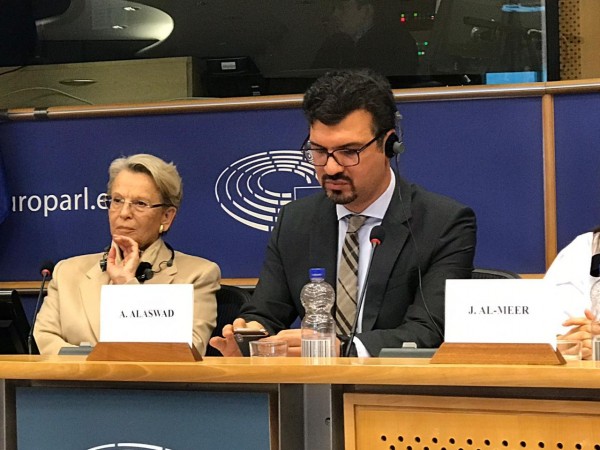Former Bahraini MP Ali Alaswad: Deficient Democracy in Bahrain: Between Dream of People's Sovereignty and Unilateral Decision-Making

Ali AlAswad - 2021-03-30 - 2:05 p
Bahrain Mirror: There is a necessity for democracy in the Middle East region for a plethora of significant considerations. The political experience in many Middle Eastern countries, including the Gulf states, is still growing towards maturity or is still far from the idea upon which democracy was built in developed countries, as individual or family rule is prevalent and there is no place for political partnership in governance or in the process of nation's life-defining decision-making, whether at the political or economic level. Peoples are not given sufficient space to control their fates, as there are many forms of formal representation, rather than actual representation.
Democracy, as we all know, means "the rule of the people'' and it is a form of governance in which all eligible citizens participate on an equal footing- either directly or through their elected representatives- in proposing, developing, and introducing laws and working towards providing the best for the individual and hence society as a whole. This demonstrates the importance of a sound democratic system, not what has been innovated by some governments, or what is known as the rule of the tribe.
I will mention here an important incident in Bahrain's political history. When the ruling family in Bahrain wanted to create a new constitution after the 1973 constitution, which had strong popular societal consensus that laid the foundation for political action but came to an end after the enactment of state security laws at the time, an Arab constitutional expert was called in. He did not hesitate to pose this question to the ruling family, "What do you want from the constitution, democracy or decision-making in the family's hands?" The outcome was that the 2002 constitution was written in a way that consolidates the powers of the ruling house. In spite of the fact that the constitution stipulates articles that speak of democratic principles "based on the ruling [party's] vision," there is no actual implementation sensed by the people of Bahrain. This refutes the basic theory of having "the rule of the people", and thus what was expected happened, as society rejected the authorities' decisions, taken unilaterally without the people having any say in them. This was followed by successive events after nine years in which the constitution did not hold its ground, and constituted an obstacle in the face of the opposition in the contribution to reform. Significant political issues are closely linked to the constitution. When there is agreement to implement the rule of the people, it must be reflected in a document that Bahrainis vote on to be granted legitimacy with agreed upon principles which shouldn't be breached by any party. Otherwise, the political problem will carry on for a long time. Perhaps the ruling family thinks that a security-driven option will spare it political tensions in the future, or it may think that the changes in the region are in favor of the government, which is a wrong understanding of the nature of the people's movement and its need for progress and development, as modernizing legislation and regulations and steering clear of issues of marginalization and exclusion falls within the framework of this process. This; however, hasn't been happening in Bahrain.
It is also important for us to point out that establishing a certain methodology for governance without thinking about accommodating, the people including all their components, does not mean success amid the current changes. The Coronavirus pandemic has caused many changes, as it is not far-fetched to assume that this global health crisis might have been one of the reasons for the defeat of former US President Donald Trump, who is a clear example of authoritarianism and unilateral decision-making.
There are many unresolved issues in Bahrain that call for genuine political representation that guarantees stability with the presence of the opposition. Some of these examples lie in addressing the economy, and improving education, health and development projects. The current structure in Bahrain majorly represents the ruling family, as decisions, after any deliberations that may take place in Parliament (in which the opposition is not represented), go back to the appointed Shura Council, which in turn sees what the interest of the ruling family is, and there the final vote prevails. This model provides a true understanding of the effective accountability of the executive bodies, which have become higher than the legislative authority, and make threats whenever parliamentarians speak up to expose an issue or raise a subject.
We must also note that the rulers' need to communicate with peoples should not depend on loyalty only, as there are many bad models that topple ruling regimes more than legitimize them, as well as abandon them with any shift that may affect their interests because the basis for building this interrelationship depends on their private interest rather than the interest of the state.
Ten years have passed during which the country has gone through successive and difficult crises on all levels. In Bahrain, we need rational governance by the authority that controls all aspects of the state, the return of the opposition to the political forefront, after lifting the political isolation law and reaching consensus on a solution, and we need to benefit from its proposition of political partnership as stated in the Bahrain Declaration. The authorities must also pay attention to all variables resulting from regional transformations in the Arab region or all over the world.
- 2024-07-10Bahrain Between External Peace and Internal Reconciliation: Unresolved Issues Require Fundamental Solutions
- 2023-10-02Latifa Al-Husseini: How Many More Blows Must Bahrain's Regime Cause Itself?
- 2023-08-07Latifa Al-Husseini: Ashura in Bahrain
- 2023-06-15Baqer Darwish: About the Government's Mobilization to Rationalize Religious Speech
- 2023-02-22Ali Al-Aswad: The Speaker of the Bahraini House of Representatives Said It